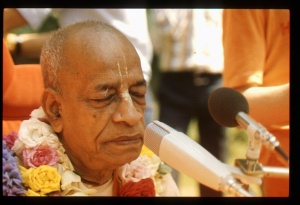SB 4.2.33: Difference between revisions
m (1 revision(s)) |
No edit summary |
||
| Line 1: | Line 1: | ||
{{info | {{info | ||
|speaker=Maitreya | |speaker=Maitreya Ṛṣi | ||
|listener=Vidura | |listener=Vidura | ||
}} | }} | ||
[[Category:Srimad-Bhagavatam - Canto 04 Chapter 02]] | |||
[[Category:Bhagavatam Verses Spoken by Maitreya Rsi - Vanisource|040233]] | |||
<div style="float:left">'''[[Srimad-Bhagavatam]] - [[SB 4|Fourth Canto]] - [[SB 4.2: Daksa Curses Lord Siva|Chapter 2: Dakṣa Curses Lord Śiva]]'''</div> | |||
<div style="float:right">[[File:Go-previous.png|link=SB 4.2.32]] '''[[SB 4.2.32]] - [[SB 4.2.34]]''' [[File:Go-next.png|link=SB 4.2.34]]</div> | |||
{{RandomImage}} | |||
==== TEXT 33 ==== | ==== TEXT 33 ==== | ||
<div | <div class="verse"> | ||
maitreya uvāca | :maitreya uvāca | ||
tasyaivaṁ vadataḥ śāpaṁ | :tasyaivaṁ vadataḥ śāpaṁ | ||
bhṛgoḥ sa bhagavān bhavaḥ | :bhṛgoḥ sa bhagavān bhavaḥ | ||
niścakrāma tataḥ kiñcid | :niścakrāma tataḥ kiñcid | ||
vimanā iva sānugaḥ | :vimanā iva sānugaḥ | ||
</div> | </div> | ||
| Line 17: | Line 23: | ||
==== SYNONYMS ==== | ==== SYNONYMS ==== | ||
<div | <div class="synonyms"> | ||
maitreyaḥ | ''maitreyaḥ uvāca''—Maitreya said; ''tasya''—of him; ''evam''—thus; ''vadataḥ''—being spoken; ''śāpam''—curse; ''bhṛgoḥ''—of Bhṛgu; ''saḥ''—he; ''bhagavān''—the possessor of all opulences; ''bhavaḥ''—Lord Śiva; ''niścakrāma''—went; ''tataḥ''—from there; ''kiñcit''—somewhat; ''vimanāḥ''—morose; ''iva''—as; ''sa-anugaḥ''—followed by his disciples. | ||
</div> | </div> | ||
| Line 24: | Line 30: | ||
==== TRANSLATION ==== | ==== TRANSLATION ==== | ||
<div | <div class="translation"> | ||
The sage Maitreya said: When such cursing and countercursing was going on between Lord Śiva's followers and the parties of Dakṣa and Bhṛgu, Lord Śiva became very morose. Not saying anything, he left the arena of the sacrifice, followed by his disciples. | The sage Maitreya said: When such cursing and countercursing was going on between Lord Śiva's followers and the parties of Dakṣa and Bhṛgu, Lord Śiva became very morose. Not saying anything, he left the arena of the sacrifice, followed by his disciples. | ||
</div> | </div> | ||
| Line 31: | Line 37: | ||
==== PURPORT ==== | ==== PURPORT ==== | ||
<div | <div class="purport"> | ||
Here Lord Śiva's excellent character is described. In spite of the cursing and countercursing between the parties of Dakṣa and Śiva, because he is the greatest Vaiṣṇava he was so sober that he did not say anything. A Vaiṣṇava is always tolerant, and Lord Śiva is considered the topmost Vaiṣṇava, so his character, as shown in this scene, is excellent. He became morose because he knew that these people, both his men and Dakṣa's, were unnecessarily cursing and countercursing one another, without any interest in spiritual life. From his point of view, he did not see anyone as lower or higher, because he is a Vaiṣṇava. As stated in Bhagavad-gītā ([[BG 5.18]]), paṇḍitāḥ sama-darśinaḥ: one who is perfectly learned does not see anyone as lesser or greater, because he sees everyone from the spiritual platform. Thus the only alternative left to Lord Śiva was to leave in order to stop his follower, Nandīśvara, as well as Bhṛgu Muni, from cursing and countercursing in that way. | Here Lord Śiva's excellent character is described. In spite of the cursing and countercursing between the parties of Dakṣa and Śiva, because he is the greatest Vaiṣṇava he was so sober that he did not say anything. A Vaiṣṇava is always tolerant, and Lord Śiva is considered the topmost Vaiṣṇava, so his character, as shown in this scene, is excellent. He became morose because he knew that these people, both his men and Dakṣa's, were unnecessarily cursing and countercursing one another, without any interest in spiritual life. From his point of view, he did not see anyone as lower or higher, because he is a Vaiṣṇava. As stated in [[Bhagavad-gita As It Is (1972)|''Bhagavad-gītā'']] ([[BG 5.18 (1972)|BG 5.18]]), ''paṇḍitāḥ sama-darśinaḥ'': one who is perfectly learned does not see anyone as lesser or greater, because he sees everyone from the spiritual platform. Thus the only alternative left to Lord Śiva was to leave in order to stop his follower, Nandīśvara, as well as Bhṛgu Muni, from cursing and countercursing in that way. | ||
</div> | </div> | ||
__NOTOC__ | |||
<div style="float:right; clear:both;">[[File:Go-previous.png|link=SB 4.2.32]] '''[[SB 4.2.32]] - [[SB 4.2.34]]''' [[File:Go-next.png|link=SB 4.2.34]]</div> | |||
__NOTOC__ | |||
__NOEDITSECTION__ | |||
Revision as of 13:42, 5 May 2021

A.C. Bhaktivedanta Swami Prabhupada
TEXT 33
- maitreya uvāca
- tasyaivaṁ vadataḥ śāpaṁ
- bhṛgoḥ sa bhagavān bhavaḥ
- niścakrāma tataḥ kiñcid
- vimanā iva sānugaḥ
SYNONYMS
maitreyaḥ uvāca—Maitreya said; tasya—of him; evam—thus; vadataḥ—being spoken; śāpam—curse; bhṛgoḥ—of Bhṛgu; saḥ—he; bhagavān—the possessor of all opulences; bhavaḥ—Lord Śiva; niścakrāma—went; tataḥ—from there; kiñcit—somewhat; vimanāḥ—morose; iva—as; sa-anugaḥ—followed by his disciples.
TRANSLATION
The sage Maitreya said: When such cursing and countercursing was going on between Lord Śiva's followers and the parties of Dakṣa and Bhṛgu, Lord Śiva became very morose. Not saying anything, he left the arena of the sacrifice, followed by his disciples.
PURPORT
Here Lord Śiva's excellent character is described. In spite of the cursing and countercursing between the parties of Dakṣa and Śiva, because he is the greatest Vaiṣṇava he was so sober that he did not say anything. A Vaiṣṇava is always tolerant, and Lord Śiva is considered the topmost Vaiṣṇava, so his character, as shown in this scene, is excellent. He became morose because he knew that these people, both his men and Dakṣa's, were unnecessarily cursing and countercursing one another, without any interest in spiritual life. From his point of view, he did not see anyone as lower or higher, because he is a Vaiṣṇava. As stated in Bhagavad-gītā (BG 5.18), paṇḍitāḥ sama-darśinaḥ: one who is perfectly learned does not see anyone as lesser or greater, because he sees everyone from the spiritual platform. Thus the only alternative left to Lord Śiva was to leave in order to stop his follower, Nandīśvara, as well as Bhṛgu Muni, from cursing and countercursing in that way.